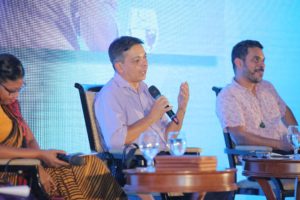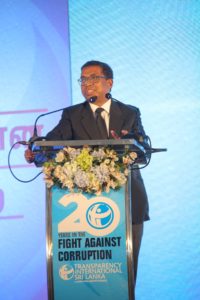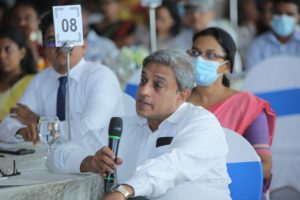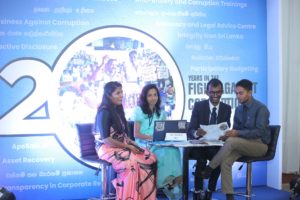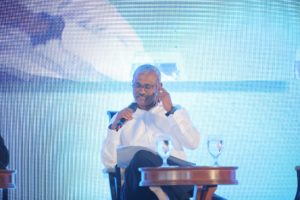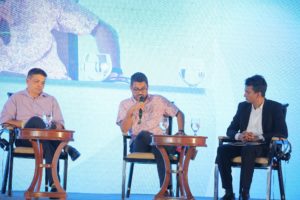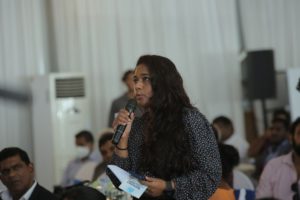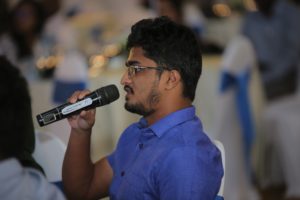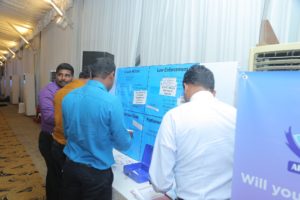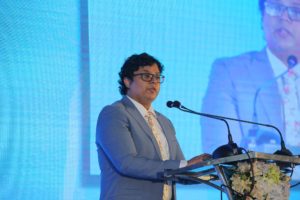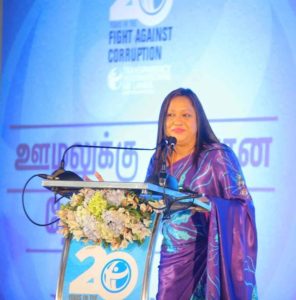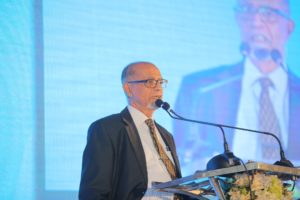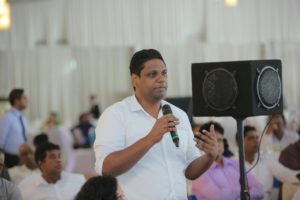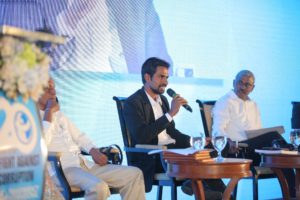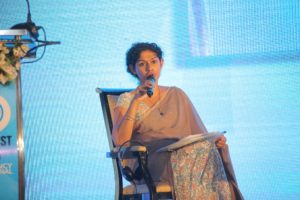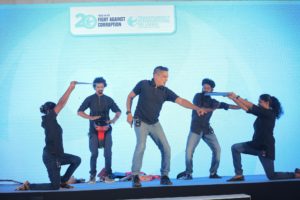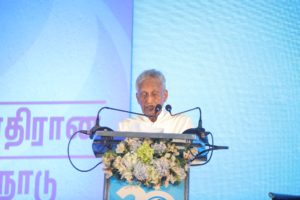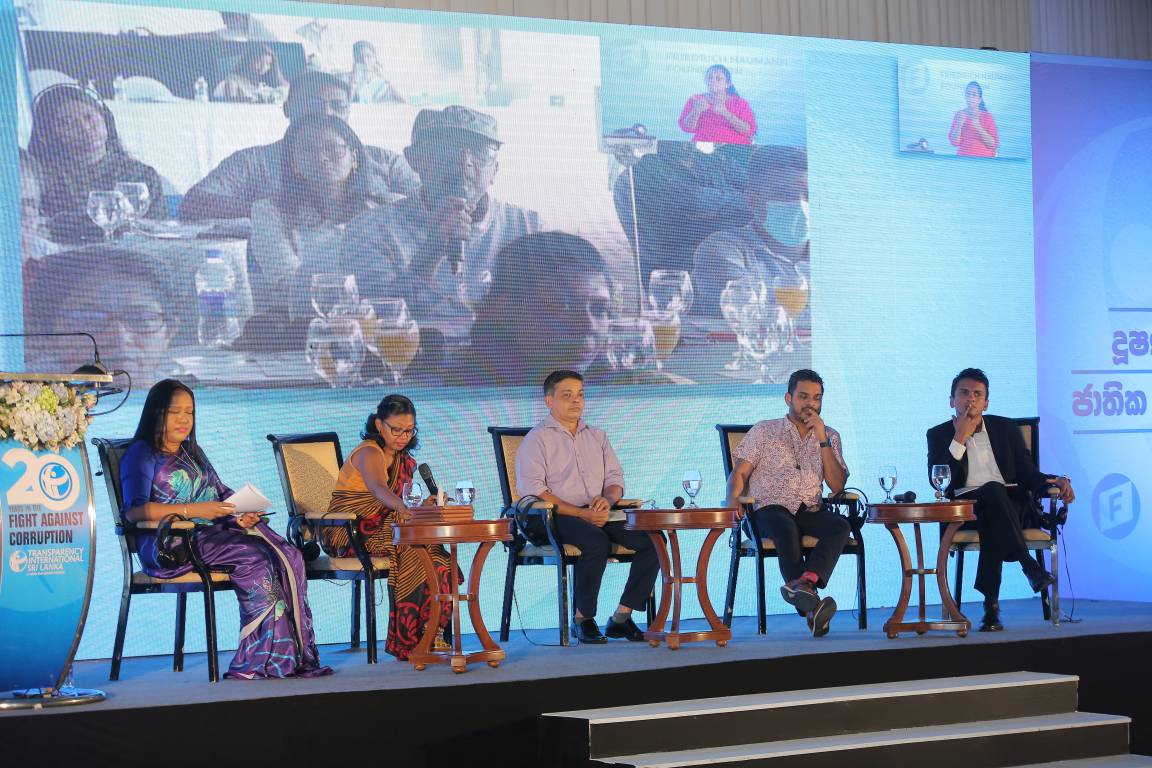Transparency International Sri Lanka (TISL) started active operations in Sri Lanka in 2002, and marks 20 years of operations this year.
As part of the commemoration of 20 years, and to mark International Anti-Corruption Day falling in December, TISL organized a national Symposium on Anti-Corruption to facilitate a rich discussion on the tactics, social cost and solutions within the context of widespread, systemic corruption that Sri Lanka faces. The Symposium created an opportunity to take forward the dialogue on building resilience in the face of corruption during this critical time in Sri Lanka, amidst the economic crisis and the unprecedented citizen uprising against corruption. “Kleptocracy & Corruption – Sri Lanka’s Silent Killer” and “Preventing & Combatting Corruption – Critical Steps Ahead” were the main topics discussed in panel discussions.
Participants ranging from anti-corruption activists, Civil Society Organizations, members of the movements from the recent civil uprising, politicians, attorneys, auditors/accountants, academics, think tanks, journalists, trade unions, private sector representatives including professional associations, donors and the diplomatic community attended the event.
Professor Jayadeva Uyangoda’s keynote speech was especially relevant to Sri Lanka’s socio-economic context, offering analysis and a possible way forward. Read the full text here.
Text of Keynote Address by Prof. Jayadeva Uyangoda at TISL’s National Symposium on Anti-Corruption
Fighting Corruption in a Decayed Democracy: Thinking the Unthinkable
Jayadeva Uyangoda
In this address, I have organized my thoughts under three themes: (i) nature of the problem of ending corruption in Sri Lanka, (ii) political and social consequences of corruption, (iii) challenges to eradicating corruption specific to Sri Lanka, and (iv) a way forward for combatting corruption.
Ending Corruption in Sri Lanka: Nature of the Problem
The rise of apolitical and bureaucratic corruption in post-colonial Sri Lanka has coincided with democratic backsliding and de-democratization. It has also been both a cause and consequence of the decay of our political institutions, democratic political culture, as well as the ethical life of the political community. The negative impact of corruption in our society and political life is so pervasive that it is a cancer in the body politic, eating into its vital organs. Therefore, fighting corruption in Sri Lanka has become closely intertwined with the struggle for democratization
How to combat corruption? This has been a public concern as well as a political slogan since the early 1990s. As a political slogan, by now it has totally lost its credibility. But, as a public concern, it has assumed a renewed relevance and significance. Two of the key slogans of the recent citizen’s aragalaya –a systemic change and a new political culture –encapsulated Sri Lankan citizens’ continuing desire for seeing a normatively and ethically clean political life.
Almost all attempts made in Sri Lanka to eradicate corruption by legal and institutional means, as well as by political propaganda, have only an uninterrupted record of failures. The task at present is about thinking the impossible while not giving up the hope that our citizens, rather than the political class, will continue to spearhead the struggle for a new political culture with no place for corruption.
Social and Political Consequences
Even a brief analysis of the problem of corruption in Sri Lanka will be helpful as a starting point. The most harmful aspect of corruption is what we call ‘political corruption.’ It is political corruption not because politicians are its key actors, practitioners and patrons. But because political corruption has become the organizing principle of our democratic politics. It has penetrated into our institutions, cultures and practices of electoral and representative democracy. That is the reason why every new government also has the dubious reputation of being a new coalition of the corrupt.
The ‘coalition of the corrupt’ is also a new power bloc, informally organized as a secret and intangible component of the political system. It has taken control of the state and society. It is a tripartite coalition of the political class, bureaucratic class and the class of the big business. It is a general perception among the people in the country that this coalition has captured at varying degrees of success the legislative, executive, law enforcement as well as justice institutions of our country. A regime change that occurs after an election, or even between elections, has now become a transfer of political power from one coalition of the corrupt to another. The only change that can happen is the replacement of the names of its old political managers with new ones. Can the Sri Lankan citizens tolerate any longer this most pernicious of degenerations to which democracy in the country has fallen?
Since last March to July this year, a host of constituencies of the Sri Lankan citizens openly and loudly proclaimed that they would no longer tolerate the regimes of the corrupt that have ruined the country’s economy, the systems of governance, as well as the collective life of the citizens. Of course, the political class has heard that cry of the citizens. Then what did the new official leaders of the political class do, no sooner than getting hold of political power? True to its nature, the political class has taken swift and well-coordinated action to silence that voice for fundamental reforms in our abuse – prone politics, battered democracy, and the degenerate political culture.
Difficulties in Eradicating Corruption
The lesson we have to learn from this experience is that Sri Lanka’s dominant coalition of the corrupt has acquired an acute survival instinct. It is also coupled with a hardnosed determination to crush any citizens’ initiative for an ethically and normatively better political life.
This conundrum of corruption is fostered by another factor. It is the ineffectiveness of the two traditional mechanisms to control corruption in Sri Lanka, namely legal process and the media exposure. When the legal process, particularly the process of investigation and prosecution, is either brought under the influence of the political class or rendered
institutionally weak , its efficacy to deliver effectively punitive justice to the corrupt becomes diminished. Contemporary Sri Lankan experience offers so many examples of this trend.
With regard to the media as a tool of combating corruption, its effectiveness is largely determined by the extent to which public exposure of corruption deters politicians and officials against whom credible allegations are made. People belonging to both these classes have cultivated over the years a distinct disregard or even disdain for media exposure, negative public opinion, or even public anger against them. We have politicians and officials who are not deterred by the conventional approach of naming and shaming the corrupt publicly in the media. Some of them have even mastered the art of turning the public shame earned through corruption into a gainful political resource. Meanwhile, getting rich by corrupt and illegal means is now touted as being smart, creative, and brave enough to take risks in business!
Then, what can the media do in situations as a guarantor of accountability and good governance? As the Sri Lankan experience during the past three and a half decades has repeatedly shown, very little indeed, unless the media joins a broad citizens’ movement for combatting corruption.
A Way Forward
So, what options do the people of Sri Lanka have to control and eventually eradicate political and other forms of corruption?
The first step is to understand the gravity of the problem, and the enormity of the task at hand. Two things need to be emphasized in this regard. The first is the recognition that there are three key actors in the formidable culture of corruption in Sri Lanka: the political class, the public sector bureaucracy, and big players in the private corporate sector. The legal recognition of the private sector as a key participant in the culture of corruption in our country is a long overdue. Any new legal reform to control corruption needs to address this fundamental lacuna in our approach to the understanding of the phenomenon of public corruption. Then only can any well-meaning reform movement, committed to public good, can think of some realistic possibility of breaking the backbone of the coalition of the corrupt.
The second step is to recognize and take redressive measures to end the citizens’ role as reluctant foster parents of our secret culture of corruption. Our overall political and administrative system is so debased that it has made most of the country’s citizens hidden participants of corruption. It is indeed a form of everyday tyranny for social survival. It starts with getting children admitted to schools. It is then extended to obtaining government employment or even getting welfare assistance from the government. Where can we, the citizens, start a struggle to end this tyranny of everyday corruption which even the poorest of our citizens are compelled to endure and participate?
As the third step, I want to suggest for your consideration the following:
(i) Bringing the goal of ending political and other forms of corruption to the heart of the democratic reform agenda of citizens’ struggles against unjust rulers. It is a relentless struggle against political and other forms of corruption that can give a normative edge to the struggle for democracy. Don’t trust the false promises made to the people during election campaigns or sham explanations made at budget speeches. In the present historical moment, democracy provides the best political and ethical framework for banishing political and other forms of corruption from public life.
(ii) Making the legal and institutional process of investigating and adjudicating public complaints on corruption open and transparent. To achieve that end, making this process free of political control and subjecting it to supervision through an independent citizens’ commission would be necessary.
(iii) Wresting the ownership of the language as well as the discourse of corruption-free public life by a citizens’ movement from the corrupt political and economic elites who also control the political institutions and the media. The new discourse should also free itself from the hollow slogans, and the platitudinal language, usually employed by the political class. Then only can it arouse democratic imaginations
of the people for inaugurating a fresh and ethically grounded collective future for our political community.
(iv) Forming a broad social and political coalition between citizens groups, trade unions, professional associations and reform -oriented political parties is an essential social mechanism of checks and balances, in order to counter the power of the dominant coalition of the corrupt.
Finally, fighting corruption is not merely a legal matter, as many in Sri Lanka appear to believe at present. Legal reforms that seek to further criminalize corrupt practices and enhance the efficacy of investigative and judicial processes are necessary. However, they are not sufficient. If corruption is the bane of democracy, more democracy is the way out from corruption. It calls for making democratic governance robust through publica participation, public supervision, and accountability to citizens with regard to the functioning of anti-corruption institutions, processes, and also the outcomes.
In other words, making citizens’ supervisory participation to be integral to the systems to combat corruption will be better than the present system of no public accountability or independent, apolitical supervision.

